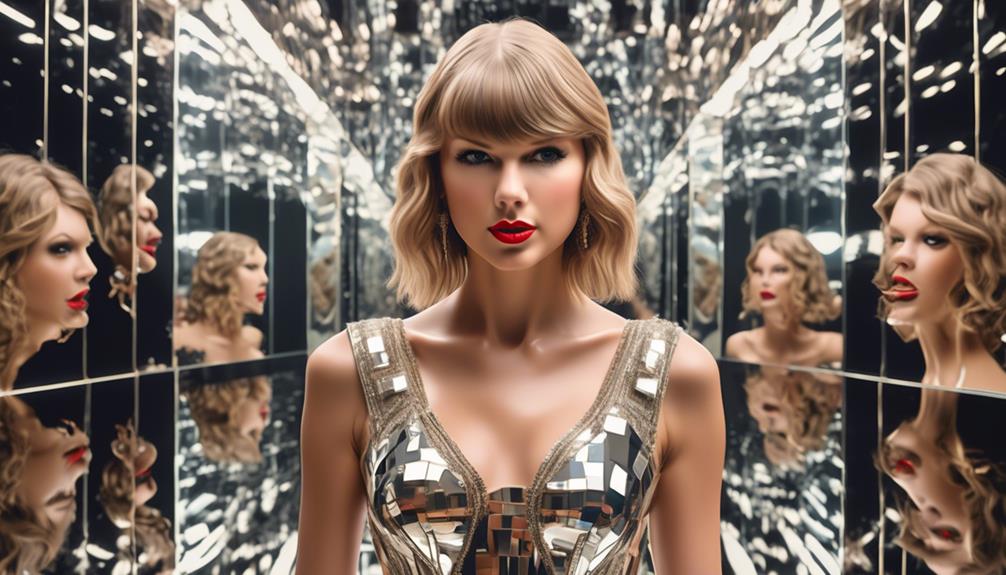Investigating the discourse surrounding Taylor Swift and the frequent portrayal of her as narcissistic piques our curiosity, particularly given the gravity of these claims.
The spotlight on her persona seems to illuminate a complex narrative that begs for closer examination. Critics and fans alike have scrutinized her every move, dissecting her lyrics and public appearances for clues to validate or debunk this contentious claim.
But is there more to this story than meets the eye? The enigma of Taylor Swift's persona continues to spark debate, prompting us to unravel the layers of perception versus reality in the realm of celebrity culture.
Key Takeaways
- Taylor Swift's public persona includes themes of vengeance and power in her songs.
- There are debates about the presence of covert narcissism in her personality.
- Swift's calculated and strategic image is scrutinized for authenticity in relationships and public interactions.
- Taylor Swift's impact on pop culture is undeniable, with her versatility and connection with fans.
Taylor Swift's Reputation and Narcissism

In evaluating Taylor Swift's reputation and potential narcissism, it's essential to consider both her public persona and the themes present in her music.
Taylor Swift has been labeled a narcissist by some critics due to her highly publicized feuds with other celebrities and the themes of vengeance and power present in songs like 'Look What You Made Me Do' and 'Bad Blood.' These songs seem to portray a more narcissistic side of Swift, where she takes on a retaliatory stance against those who've wronged her.
However, delving deeper into Swift's discography, songs like 'Anti-Hero' reveal a more vulnerable and introspective side of the artist, challenging the notion of her being solely narcissistic. This Covert Narcissism, where one displays traits of narcissism while also showcasing vulnerability and self-awareness, adds complexity to the discussion of Taylor Swift's supposed narcissism.
It's crucial to analyze the nuances in her music and public image before categorizing Swift solely as a narcissist based on surface-level interpretations.
Analyzing Taylor Swift's Public Persona

Examining Taylor Swift's public persona reveals a calculated and strategic image that prompts questions about her authenticity. Swift's adept use of social media to carefully curate her image has sparked discussions around narcissistic traits. While analyzing her relationships and public interactions, one may wonder if there are underlying signs of covert narcissism. It is essential to approach this topic with sensitivity towards mental health considerations, such as narcissistic personality disorder (NPD). Swift's sense of entitlement, as perceived by some, adds complexity to understanding her persona. To delve into her public image, we must acknowledge the intricacies of navigating fame and scrutiny. Below is a table summarizing key aspects for consideration when evaluating Taylor Swift's public persona:
| Key Aspect | Implications |
|---|---|
| Social Media Presence | Control over narrative |
| Relationship Dynamics | Scrutinized for authenticity |
| Authenticity vs. Strategy | Balancing public image with true self |
| Mental Health Awareness | Understanding the impact of perceptions |
The Thin Line Between Confidence and Narcissism
Considering Taylor Swift's carefully curated public persona, it becomes imperative to discern the fine line between confidence and narcissism. Confidence is characterized by a healthy self-assurance, rooted in self-awareness and self-acceptance. In contrast, narcissism stems from insecurity and a constant need for validation, often manifesting in a lack of empathy and manipulative behaviors.
To differentiate between the two, one must carefully examine the following:
- Confidence: Built on self-awareness and respect for others.
- Narcissism: Rooted in insecurity, lack of empathy, and manipulation for personal gain.
- Balancing Act: The thin line between confidence and narcissism lies in maintaining self-assurance while considering the feelings and perspectives of others.
- Entitlement vs. Humility: Narcissists often exhibit a sense of superiority and entitlement, whereas confident individuals remain humble and open to learning.
- Impact on Relationships: Understanding this distinction is crucial in recognizing healthy dynamics in romantic relationships, preventing potential narcissistic abuse while fostering mutual respect and empathy.
Taylor Swift's Impact on Pop Culture

Taylor Swift's influence on pop culture is undeniable, resonating through her music and public persona. Swift's ability to connect with fans on a personal level through her songs, which often delve into her own experiences and emotions, has solidified her impact.
Her career showcases versatility and creativity as she transitions between genres, challenging traditional boundaries. While some critics have labeled her as a covert narcissist due to perceived feuds and media portrayals, Swift's actions, such as engaging with fans on social media and displaying altruism by rewarding her staff, demonstrate a more nuanced persona.
These gestures suggest a healthy approach to relationships and a genuine care for others, countering the notion of an inflated sense of self-importance. Swift's positive influence on pop culture is further amplified by her relatability and generosity, shaping her image as an artist who values authenticity and connection with her audience.
Unveiling the Truth Behind Taylor Swift's Image
As we explore Taylor Swift's image further, it becomes evident that public perceptions often diverge from the complexities of her real-life persona and actions. Despite being labeled a narcissist by some, it's crucial to delve deeper into the nuances of her behavior and motivations to uncover the truth behind her public image.
- Taylor Swift's image is shaped by her personal experiences and emotions, often reflected in her music.
- Swift has faced criticisms and controversies, including highly publicized feuds with other celebrities.
- Her active online presence and engagement with fans contribute to her perceived relatability and approachability.
- The public's fascination with Swift's relationships has sparked debates regarding the presence of covert narcissism in her personality.
- It's essential to recognize the spectrum of behaviors within narcissism and consider the potential disguise of altruism as a means of abuse within this context.
Frequently Asked Questions
Which Personality Type Tends to Be Narcissistic?
Personality types that tend to exhibit narcissistic traits often display a grandiose sense of self-importance. They have a need for excessive admiration and a lack of empathy towards others. These individuals may exploit relationships for personal gain and require constant validation of their superiority.
It's important to recognize the signs of narcissism to establish healthy boundaries. This will help protect oneself from potential manipulation and emotional harm.
Do Narcissists Know They Are Narcissists?
Yes, narcissists often lack self-awareness regarding their own narcissistic traits. They may project their behaviors onto others.
These individuals are skilled manipulators, using tactics like gaslighting to control and deceive. Responsibility avoidance and blame-shifting are common.
Dealing with narcissists requires firm boundaries and possibly professional intervention. It's crucial to recognize these patterns and protect oneself from their harmful effects.
Conclusion
In conclusion, while Taylor Swift may be perceived as a narcissist by some, it's important to consider the complexities of her public image.
One interesting statistic to note is that Swift has won 11 Grammy Awards and holds the record for the most wins by a female artist in the Album of the Year category. This achievement speaks to her undeniable talent and impact on the music industry, challenging the notion of her being solely focused on herself.









